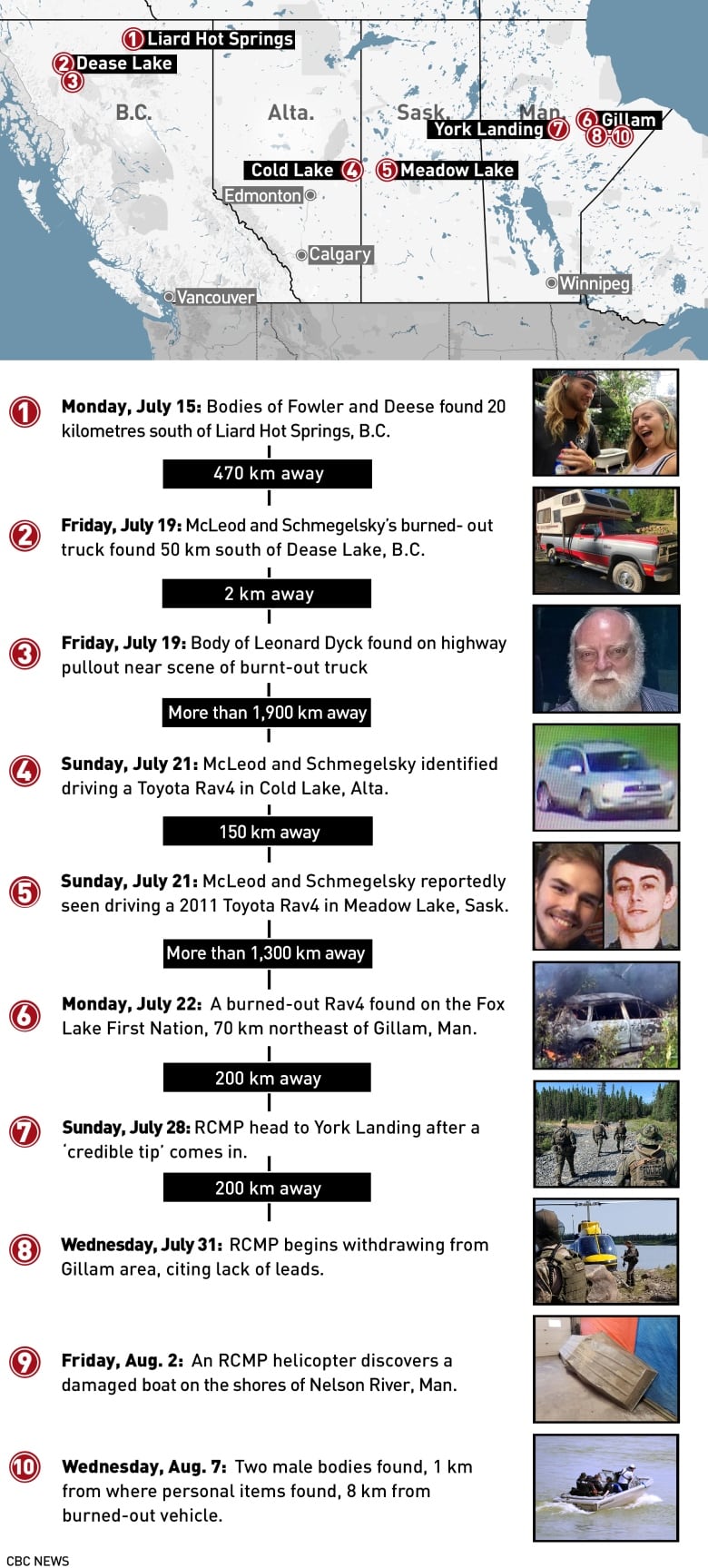Fatigue, 'maze' of bush and B.C. suspects' desperation elevate risk to police as search drags on: experts
RCMP scouring northern Manitoba for homicide suspects Kam McLeod, 19, and Bryer Schmegelsky, 18

Unforgiving terrain, fatigue and the potential desperation of the two suspects wanted in three B.C. killings ramp up the risk to police officers involved in the days-long search in northern Manitoba, experts say.
"Police are telling everybody that they're armed and dangerous. You're going in to deal with armed and dangerous. That's what your job is," said Rob Creasser, a retired RCMP officer.
"Does it make it easy? Absolutely not."
Police started scouring the woods around Gillam, Man., and Fox Lake Cree Nation for Kam McLeod, 19, and Bryer Schmegelsky, 18, after a burnt-out vehicle driven by the pair was found near Fox Lake Monday.
The Port Alberni, B.C., men are suspects in the shooting deaths of a tourist couple in northern B.C. last week, and have been charged with second-degree murder after a man's body was found days later near Dease Lake.
Criminal psychologists have said the risk for more violence increases as the days drag on.
July 21 surveillance video of the suspects in Meadow Lake, Sask.:
Creasser pointed to an interview by The Canadian Press with Schmegelsky's father, Alan Schmegelsky, who said his son is on a "suicide mission."
"There was a term that I'm sure is still used, it's called 'suicide by police,' where these people are … like an animal that's been backed into a corner," Creasser said.
"That's a huge concern to the front-line resources that are out there."
Searching 'in a maze'
On Friday, Public Safety Minister Ralph Goodale wrote in a tweet that the armed forces would provide aircraft support to RCMP for the search.
The search has already involved officers from multiple police services, along with the use of a drone, a helicopter, a canine unit and checkpoints around the Gillam area.
At a Friday news conference, the RCMP said someone may have inadvertently helped the men leave the area, but stressed there have been no confirmed sightings of the two since they were seen in the Gillam area on Monday.
The search has taken officers into rugged backcountry, where muskeg and other harsh terrain heightens risk, Creasser said.
"You're in a maze, really, where you don't know where the next turn is going to be," he said. "That just adds to the danger of this whole situation."
Tom Stamatakis, president of the Canadian Police Association, which represents some RCMP members, said the environment means officers will face challenges even without encountering the suspects.
"You're going to be dealing with things like fatigue, and making sure that they have the right kind of nourishment and [that] they're taking care of them," Stamatakis said.
After hours upon hours of unsuccessful searching in the buggy, swampy terrain, he said officers need to stay ready. Because if a confrontation happens, it will likely happen suddenly.
"You go from sort of hours and hours of routine, even boring kind of activity, to massive, high-level, high-adrenaline, high-risk activity in a matter of an instant," he said.
"I think the biggest challenge is just to stay focused and alert and observant, so that when somebody does eventually come across these two suspects, they're prepared for it."

Training can't eliminate risk
Creasser said it's difficult to train officers for rare, high-risk scenarios like a potential confrontation with McLeod and Schmegelsky. If it happens, it will be impossible to eliminate risk, he said.
"I don't think there is anything [you can do], to be quite honest with you. These things, thank God, they don't happen that often," he said.
"I think all the training in the world wouldn't prevent something bad happening," to the police, such as an officer's death, he said.
"And that's unsettling."

Stamatakis said it's impossible to exactly replicate the emotional experience of such an encounter in a training environment.
"Police officers are people too, and they experience all the same emotions that any other person does," he said.
"We try and prepare police officers as much as we can, but … there's going to be lots of anxiety and adrenaline and fear."
Sherry Benson-Podolchuk, a former RCMP officer with 20 years of experience, said she'll never forget the night she was involved in a manhunt, after a man shot and killed his wife, then went on the run.
"That stress hormone is pulsating through your body," Benson-Podolchuk told Ismaila Alfa, host of CBC Manitoba's afternoon radio show Up to Speed.
"One, you want to find the suspect so he doesn't hurt anybody. Two, you want to be safe. The police officers want to come home.
"And three, you want to make sure the suspect you bring in … that he or she is not harmed as well."

With files from CBC Manitoba's Up To Speed and Ian Froese
